| Listing 1 - 8 of 8 |
Sort by
|
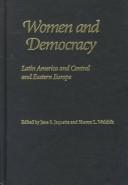
ISBN: 0801858380 Year: 1998 Publisher: Baltimore, Md The Johns Hopkins University Press
Abstract | Keywords | Export | Availability | Bookmark
 Loading...
Loading...Choose an application
- Reference Manager
- EndNote
- RefWorks (Direct export to RefWorks)
De bijdragen in dit boek onderzoeken of, en zo ja, hoe vrouwen gebruik maken van de overgangsfase van dictatuur naar democratie om gelijke rechten en gelijke kansen op de politieke agenda te plaatsen en hun plaats op te eisen in het publieke leven. In Latijns-Amerika blijken vrouwen zich inderdaad politiek te organiseren en te engageren, in Centraal en Oost-Europa daarentegen lijken vrouwen het publieke veld te mijden en zich in traditionele rollen terug te trekken. Tot slot wordt meer algemeen stilgestaan bij de (mogelijke) rol van vrouwen in het proces van democratievorming.
Political systems --- Community organization --- Latin America --- Eastern and Central Europe --- Women in politics --- Europe [Central ] --- Europe [Eastern ] --- Democracy --- Political participation --- Women's movements --- Book
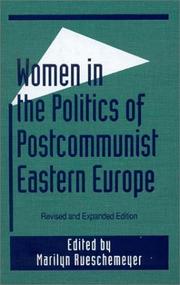
ISBN: 0765602954 0765602962 9781315292656 1315292653 1315292645 9781315292649 9781315292625 1315292629 9781315292632 1315292637 058520134X 9780765602954 9780765602961 Year: 1998 Publisher: Armonk, N.Y. M.E. Sharpe
Abstract | Keywords | Export | Availability | Bookmark
 Loading...
Loading...Choose an application
- Reference Manager
- EndNote
- RefWorks (Direct export to RefWorks)
Women --- Femmes --- Political activity --- Activité politique --- Europe, Eastern --- Europe de l'Est --- Politics and government --- Politique et gouvernement --- Activité politique --- Politics --- Yugoslavia --- Russia --- Czech Republic --- Poland --- Slovakia --- Bulgaria --- Germany --- Hungary --- Albania --- Romania --- Eastern and Central Europe --- Politicians --- Book
Multi
ISBN: 9781108424691 9781108341332 9781108440844 Year: 2018 Publisher: Cambridge Cambridge University
Abstract | Keywords | Export | Availability | Bookmark
 Loading...
Loading...Choose an application
- Reference Manager
- EndNote
- RefWorks (Direct export to RefWorks)
"In communist Czechoslovakia, there were two distinct approaches to sexuality and gender. The first one went like this: sex should occur between equals, and men and women should be equal and free of the bourgeois shackles of property. Indeed, before entering into marriage, people were expected to get to know each other, whether in the workplace or at collective volunteer work units. The other approach to sexuality claimed the following: Men and women are fundamentally different and marriage only works if men are superior to women. That is, if gender arrangements are not ordered this way, women will suffer in a way similar to sexual dissatisfaction. In this approach, it is one's nuclear family and spouse that are the only safe social bonds. These types of statements capture the attitudes towards sex, gender, and family as they changed throughout the years in Czechoslovakia. The first approach to sexuality and gender is characteristic of the long 1950s, i.e. the period since the communists took power in 1948 until the early 1960s when discourses began to shift. The second approach, from the 1970s, sums up the attitude of the period called 'Normalization' which followed the failed attempts of the Prague Spring of 1968. This book tracks what it took to get from one approach to the other"--
Sex customs --- Sexual ethics --- HISTORY / Europe / Eastern. --- Sociology of the family. Sociology of sexuality --- Political systems --- anno 1950-1959 --- anno 1900-1999 --- Czechoslovakia --- Gender --- Family --- Orgasms --- Government policy --- Attitudes --- Sexuality --- Book --- Communism
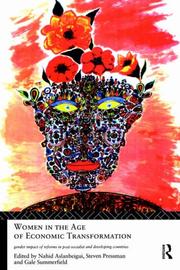
ISBN: 0415104238 041510422X Year: 1994 Publisher: London : Routledge,
Abstract | Keywords | Export | Availability | Bookmark
 Loading...
Loading...Choose an application
- Reference Manager
- EndNote
- RefWorks (Direct export to RefWorks)
Sociology of the family. Sociology of sexuality --- Women --- Femmes --- Economic conditions --- Social conditions --- Conditions économiques --- Conditions sociales --- Developing countries --- Europe, Eastern --- Pays en développement --- Europe de l'Est --- Economic conditions. --- Social conditions. --- Conditions économiques --- Pays en développement --- Russia --- South Korea --- Poland --- Nicaragua --- China --- Singapore --- Chile --- Germany (GDR) --- Mexico --- Romania --- Healthcare --- Labour --- Government policy --- Book --- Chiffres --- Economy
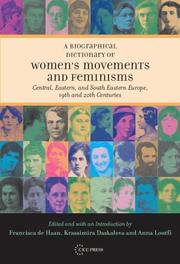
ISBN: 9637326391 9789637326394 9637326405 9789637326400 Year: 2006 Publisher: Budapest ; New York CEU Press
Abstract | Keywords | Export | Availability | Bookmark
 Loading...
Loading...Choose an application
- Reference Manager
- EndNote
- RefWorks (Direct export to RefWorks)
"This Biographical Dictionary describes the lives, works and aspirations of more than 150 women and men who were active in, or part of, women's movements and feminisms in Central, Eastern and South Eastern Europe. Thus, it challenges the widely held belief that there was no historical feminism in this part of Europe. These biographical portraits not only show that feminists existed here, but also that they were widespread and diverse, and included Romanian princesses, Serbian philosophers and peasants, Latvian and Slovakian novelists, Albanian teachers, Hungarian Christian social workers and activists of the Catholic women's movements, Austrian factory workers, Bulgarian feminist scientists and socialist feminists, Russian radicals, philanthropists, militant suffragists and Bolshevik activists, prominent writers and philosophers of the Ottoman era, as well as Turkish republican leftist political activists and nationalists, internationally recognized Greek feminist leaders, Estonian pharmacologists and science historians, Czech avant-garde painters, Polish and Czech Senate Members, and many more. Their stories together constitute a rich tapestry of feminist activity and redress a serious imbalance in the historiography of women's movements and feminisms."--BOOK JACKET. Annotation Contains 150 expertly-researched biographical portraits (with pictures) of women and men who were active in, or part of, women's movements and feminisms in 22 countries in Central, Eastern and South Eastern Europe in the 19th and 20th centuries. The portraits include Romanian princesses, Serbian philosophers and peasants, Latvian and Slovakian novelists, Albanian teachers, Hungarian Catholic social workers, Austrian factory workers, Bulgarian feminist scientists and socialist feminists, Russian radicals and philanthropists, Turkish republican leftist political activists and nationalists, internationally recognized Greek feminist leaders, and so on, from all walks of life. Their stories together constitute a rich tapestry of feminist activity, rejecting the notion that either there was no feminism here, or that it was 'imported from the West.' The editors conclude that "if our biographical subjects were able to bridge the contradictions between feminism, nationalism, socialism, communism, philanthropy and revolution in their own lives--then surely historiansmust adopt similarly open approaches to their own research and methodologies, rather than creating forms of closure through the use of predefined and potentially limited categories."
Feminists --- Féministes --- Biography --- Dictionaries --- Biographie --- Dictionnaires anglais --- BIOGRAPHY & AUTOBIOGRAPHY --- SOCIAL SCIENCE --- Feminists. --- Feminisme. --- Social Scientists & Psychologists. --- Feminism & Feminist Theory. --- Europe, Central. --- Europe, Eastern. --- Europe, Southern. --- Oost-Europa. --- Balkan. --- Turkije. --- 396 --- 929:396 --- Feminisme. Vrouwenbeweging. Vrouw en maatschappij --- Biografieen: vrouwen --- 929:396 Biografieen: vrouwen --- 396 Feminisme. Vrouwenbeweging. Vrouw en maatschappij --- Féministes --- Community organization --- Sociology of the family. Sociology of sexuality --- anno 1900-1999 --- anno 1800-1899 --- South Europe --- Turkey --- Eastern and Central Europe --- Feminism --- Social reformers --- Dictionaries. --- 396 Feminism. Women's movement. Woman and society --- Feminism. Women's movement. Woman and society --- Women's movements --- Biographical overview --- Book
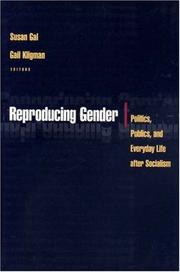
ISBN: 0691048673 0691048681 0691228019 9780691048673 9780691048680 Year: 2000 Publisher: Princeton Princeton University Press
Abstract | Keywords | Export | Availability | Bookmark
 Loading...
Loading...Choose an application
- Reference Manager
- EndNote
- RefWorks (Direct export to RefWorks)
The striking fact that abortion was among the first issues raised, after 1989, by almost all of the newly formed governments of East Central Europe points to the significance of gender and reproduction in the postsocialist transformations. The fourteen studies in this volume result from a comparative, collaborative research project on the complex relationship between ideas and practices of gender, and political economic change. The book presents detailed evidence about women's and men's new circumstances in eight of the former communist countries, exploring the intersection of politics and the life cycle, the differential effects of economic restructuring, and women's public and political participation. Individual contributions on the former German Democratic Republic, Poland, the Czech Republic, Slovakia, Hungary, Serbia, Romania, and Bulgaria provide rich empirical data and interpretive insights on postsocialist transformation analyzed from a gendered perspective. Drawing on multiple methods and disciplines, these original papers advance scholarship in several fields, including anthropology, sociology, women's studies, law, comparative political science, and regional studies. The analyses make clear that practices of gender, and ideas about the differences between men and women, have been crucial in shaping the broad social changes that have followed the collapse of communism. In addition to the editors, the contributors are Eleonora Zieliãska, Eva Maleck-Lewy, Myra Marx Ferree, Sharon Wolchik, Irene Dölling, Daphne Hahn, Sylka Scholz, Mira Marody, Anna Giza-Poleszczuk, Katalin Kovács, Mónika Váradi, Julia Szalai, Adriana Baban, MaÏgorzata Fuszara, Laura Grunberg, Zorica Mrseviâ, Krassimira Daskalova, Joanna Goven, and Jasmina Lukiâ.
Women --- Birth control --- Women's rights --- Femmes --- Régulation des naissances --- Social conditions. --- Conditions sociales --- Droits --- Europe, Eastern --- Europe de l'Est --- Social conditions --- Ethics of family. Ethics of sexuality --- Sociology of culture --- Social problems --- Sexology --- Gynaecology. Obstetrics --- Politics --- Political systems --- Family law. Inheritance law --- Sociology of the family. Sociology of sexuality --- Eastern and Central Europe --- Gezinsethiek. Seksuele ethiek --- Sociologie van de cultuur --- Sociale problemen --- Sociologie van het gezin. Sociologie van de seksualiteit --- Politieke systemen --- Politiek --- Familierecht. Erfrecht --- Seksuologie --- Gynaecologie. Obstetrica --- Oost- en Centraal-Europa --- SOCIAL SCIENCE / Women's Studies. --- Rights of women --- Human rights --- Human females --- Wimmin --- Woman --- Womon --- Womyn --- Females --- Human beings --- Femininity --- Population control --- Pregnancy --- Family planning --- Contraception --- Reproductive rights --- Civil rights --- Law and legislation --- Legal status, laws, etc. --- Prevention --- Women's rights. --- Women. --- Birth control. --- Descriptive sociology --- Social history --- History --- Sociology --- Feminism --- Eastern Europe. --- East Europe --- Eastern Europe --- Social and moral questions --- Gender --- Violence --- Political participation --- Sexuality --- Book --- Abortion --- Daily life
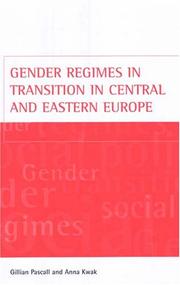
ISBN: 1281159646 9786611159641 184742144X 1861346255 9781847421449 9781861346254 9781847424204 Year: 2005 Publisher: Bristol The Policy Press
Abstract | Keywords | Export | Availability | Bookmark
 Loading...
Loading...Choose an application
- Reference Manager
- EndNote
- RefWorks (Direct export to RefWorks)
This book uses recent debates on welfare regimes and gender to illuminate the changing gender regimes in countries of Central and Eastern Europe. It has particular significance as countries in the region make the transition from communism into a European Union with issues of women's employment and gender equality at the heart of its social policy.
Family policy --- Sex role --- Social change --- Europe, Eastern --- Europe, Central --- Social conditions --- Families --- Families and state --- State and families --- Public welfare --- Social security --- Social policy --- Change, Social --- Cultural change --- Cultural transformation --- Societal change --- Socio-cultural change --- Social history --- Social evolution --- Gender role --- Sex (Psychology) --- Sex differences (Psychology) --- Social role --- Gender expression --- Sexism --- Government policy --- Gender roles --- Gendered role --- Gendered roles --- Role, Gender --- Role, Gendered --- Role, Sex --- Roles, Gender --- Roles, Gendered --- Roles, Sex --- Sex roles --- Political philosophy. Social philosophy --- Sociology of the developing countries --- Sociology of the family. Sociology of sexuality --- Sociology of work --- Sociology of social care --- Sociology of social welfare --- Political transition --- Equal opportunities --- Family --- Labour --- Care --- Book --- Communism --- Poland --- Eastern and Central Europe --- Europe --- Mothers --- Rôle selon le sexe --- Changement social --- Mères --- Conditions sociales --- Social conditions. --- Family policy. --- Gender roles. --- Samhällsutveckling --- Social development --- Östeuropa --- Centraleuropa --- Sociala förhållanden
Book
ISBN: 0814712487 0814723411 9780814723418 0814712479 9780814712474 9780814712481 Year: 1995 Volume: vol. 22 Publisher: New York : Baltimore, Md. : University Press, Project MUSE,
Abstract | Keywords | Export | Availability | Bookmark
 Loading...
Loading...Choose an application
- Reference Manager
- EndNote
- RefWorks (Direct export to RefWorks)
The epidemic of mass rape in the former Yugoslavia has illustrated once again, and in particularly brutal fashion, the inextricable relationship between national politics, sexual politics, and body politics. The nexus of these three forces is highly charged in any culture, at any time in history, but especially so among cultures in which rapid, even cataclysmic, changes in material realities and national self-conceptions are eroding or overwhelming previously secure boundaries.The postcommunist moment in the so-called Second World--Central and Eastern Europe and the former Soviet Union--has dramatically exposed the opportunities and dangers that arise when the political, cultural, and economic foundations of a society are de- and then re-structured. Gender roles and relations, expressions of sexuality or attempts to recontain them, representations of the body, especially the female body, and the larger, cultural meanings it assumes, are particularly marked sites to witness the performance of complex national dramas of crisis and change.This groundbreaking volume turns its attention to the Second World, specifically to such subjects as the birth of the sex media and porn industry in Russia; Russian women and alcoholism; cinema in post-communist Hungary; patriotism and gender in Poland; sexual dissidence in Eastern Europe; and women in the former Yugoslavia. ›[ go to the Genders website ]
Political philosophy. Social philosophy --- Film --- Toxicology --- Sociology of the family. Sociology of sexuality --- Sexology --- Mass communications --- Ethics and addiction --- Thematology --- Germany --- Yugoslavia --- Russia --- Poland --- Hungary --- Germany (GDR) --- Feminism - Former Soviet republics. --- Post-communism. --- Human body --- Social aspects. --- Postcommunism --- World politics --- Communism --- Sex role --- Europe [Eastern ] --- Former Soviet republics --- Post-communism --- Women --- Social conditions --- Feminism --- Emancipation of women --- Feminist movement --- Women's lib --- Women's liberation --- Women's liberation movement --- Women's movement --- Social movements --- Anti-feminism --- Emancipation --- Frau --- Feminismus --- Sozioökonomischer Wandel --- Geschlechterrolle --- Postkommunismus --- Sex role. --- Feminism. --- Social conditions. --- Russland --- Osteuropa --- Soviet Union --- Eastern Europe. --- Human females --- Wimmin --- Woman --- Womon --- Womyn --- Females --- Human beings --- Femininity --- East Europe --- Eastern Europe --- Советский Союз --- Ber. ha-M. --- Związek Socjalistycznych Republik Radzieckich --- ZSRR --- Związek Socjalistycznych Republik Sowieckich --- ZSRS --- Szovjetunió --- TSRS --- Tarybų Socialistinių Respublikų Sąjunga --- SRSR --- Soi︠u︡z Radi︠a︡nsʹkykh Sot︠s︡ialistychnykh Respublik --- SSSR --- Soi︠u︡z Sovetskikh Sot︠s︡ialisticheskikh Respublik --- UdSSR --- Shūravī --- Ittiḥād-i Jamāhīr-i Ishtirākīyah-i Shūrāʼīyah --- Russia (1923- U.S.S.R.) --- Sovetskiy Soyuz --- Soyuz SSR --- Sovetskiĭ Soi︠u︡z --- Soi︠u︡z SSR --- Uni Sovjet --- Union of Soviet Socialist Republics --- USSR --- SSṚM --- Sovetakan Sotsʻialistakan Ṛespublikaneri Miutʻyun --- SSHM --- Sovetakan Sotsʻialistakan Hanrapetutʻyunneri Miutʻyun --- URSS --- Unión de Repúblicas Socialistas Soviéticas --- Berit ha-Moʻatsot --- Rusyah --- Ittiḥād al-Sūfiyītī --- Rusiyah --- Rusland --- Soṿet-Rusland --- Uni Soviet --- Union soviétique --- Zȯvlȯlt Kholboot Uls --- Związek Radziecki --- ESSD --- Sahaphāp Sōwīat --- KhSHM --- SSR Kavširi --- SNTL --- PSRS --- Su-lien --- Sobhieṭ Ẏuniẏana --- FSSR --- Unione Sovietica --- Ittiḥād-i Shūravī --- Soviyat Yūniyan --- Russian S.F.S.R. --- Europa --- Östliches Europa --- Central Europe --- Osteuropäer --- Ostblock --- Ostmitteleuropa --- Rußland --- Krievija --- Federazione Russa --- RF --- Großrussland --- Großrußland --- Rossijskaja Imperija --- Russie --- Empire de Russie --- Russian Federation --- Federacja Rosyjska --- Rosja --- Rossija --- Rossijskaja Federacija --- Russische Föderation --- Russisches Reich --- РФ --- Российская Федерация --- Российская Империя --- Russische SFSR --- -1917 --- 25.12.1991 --- -Political philosophy. Social philosophy --- -Sex role --- Gender role --- Sex (Psychology) --- Sex differences (Psychology) --- Social role --- Gender expression --- Sexism --- Gender roles --- Gendered role --- Gendered roles --- Role, Gender --- Role, Gendered --- Role, Sex --- Roles, Gender --- Roles, Gendered --- Roles, Sex --- Sex roles --- -Frau --- -Советский Союз --- Postsozialismus --- Gender --- Geschlechtsrolle --- Soziales Geschlecht --- Soziale Rolle --- Geschlechtsunterschied --- Sozioökonomische Entwicklung --- Sozioökonomisches System --- Wirtschaftsentwicklung --- Fortschritt --- Feministische Theorie --- Frauenbewegung --- Frauenforschung --- Feministische Philosophie --- Erwachsene Frau --- Weib --- Weibliche Erwachsene --- Frauen --- Erwachsener --- Weiblichkeit --- Entwicklung --- Wandel --- Sozialer Wandel --- Movies --- Alcohol addiction --- Homosexuality --- Media --- Nationalism --- Pornography --- Sexuality --- Writers --- Book --- Frau. --- Feminismus. --- Sozioökonomischer Wandel. --- Geschlechterrolle. --- Postkommunismus. --- Russland. --- Osteuropa. --- Europe, Eastern.
| Listing 1 - 8 of 8 |
Sort by
|

 Search
Search Feedback
Feedback About UniCat
About UniCat  Help
Help News
News